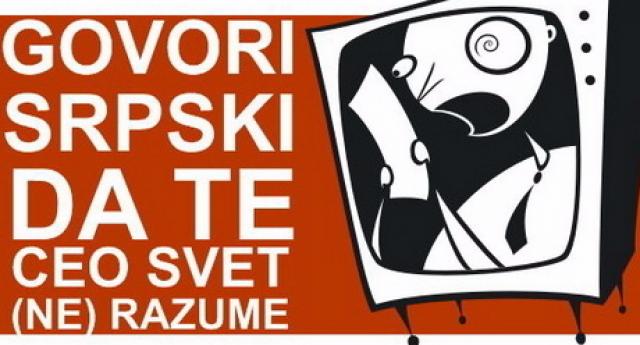
Photo: Speak Serbian for the entire world (not) to understand you. Picture extracted from http://www.e-novine.com/kultura/kultura-tema/127774-God-save-the-srpski-jezik.html
People tend to learn languages due to a variety of reasons: because of professional oportunities, as a hobby, because of plans to move out, etc. However, it seems that, generally, there exist “first-class” and “second-class” languages.
To start this argument, I will give a very clear example: imagine that you intend to start learning Danish. Now, visualize the reaction of your closest friends and your family… Do you think they would support you? I can bet that mostly yes. After this, now suppose that you propose to learn Czech. Which reaction would they have? Probably, not the same at all. What is the difference between these 2 languages? It is definitely not a matter of number of speakers or international extent, since Czech has 2 times more native speakers than Danish, and both languages are just spoken in their original countries. The main issue here is reputation.
As in our example, there are languages that enjoy a brilliant international reputation: they are directly linked to the success of their societies and an opening-up of opportunities. It is the case of Scandinavian languages, for example. As an anecdote, everyone knows at least one person willing to learn one of those languages when she/he will find the time. I know at least 3 of them.
Contrarily, there are languages regarded as useless. Most people tend to think that learning about them is a waste of time. They probably do not even know their regional (or even international) repercussion nor the exact number of speakers, but this seems not to matter at all. Why? Because their reputation is low. Unfortunately, I must admit that all (or almost all) Balkan languages are included in this awful category. Maybe only Greek has gained some sort of prestige, and not especially because of its present but of its glorious past.
I started learning BCSM (Bosnian-Croatian-Serbian-Montenegrin) by 2016 on my own and I started receiving lessons in September 2017. While talking with people about this, the questions that emerge the most frequently are: “Why do you learn it?”, “is it really useful when you travel abroad?”, “but, how many people talk it? and in which countries? only in Serbia or…?”, “isn’t it more worthwhile to learn languages such as German, Russian, Chinese…?”.
The issue here is that probably most people who decide to learn BCSM does not do it by thinking on its possibilities in the international sphere’s daily communication, but by thinking on learning about former Yugoslavia and the future paths of the independent states, on being able to read first-hand documents, to communicate with witnesses and to travel all around the region without facing language barriers.
With this reflection, we arrive at the end of this article: Why should we defend all (non-)useless languages? First of all, because learning must exclusively be an enrichment. The process of learning should never be started by thinking of the consequences of it but by thrilling to delve into it. Culture, a category that embraces languages, should not be a mean to reach to an end but the end itself. Secondly, the classification of languages according to their prestige is just one of the outcomes that emerge from the creation of a culturally close-minded society. Only the multiculturalist education owns the key to a cultural change.